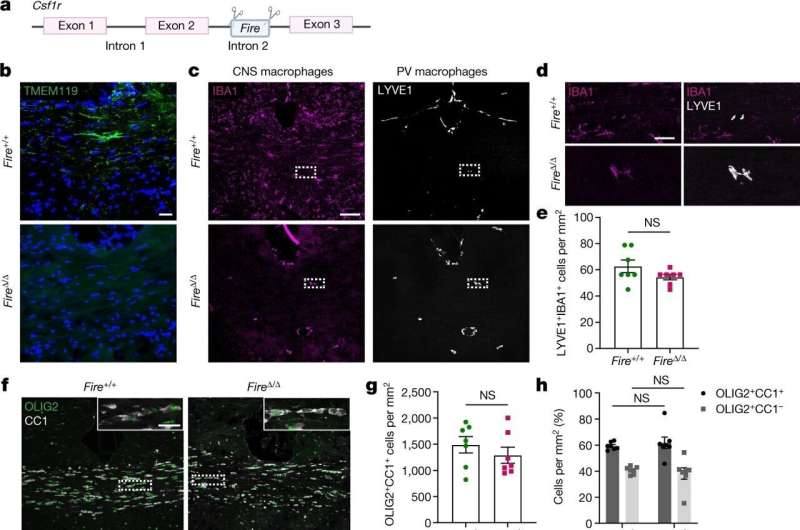Immune cells help protect brain health and cognition, finds study

Scientists have discovered that immune cells, known as microglia, help maintain the health of myelin—the insulating layer that forms around nerve cells—which is important for nerve cells in the brain and spinal cord to function optimally.
Changes in the structure of myelin and damage to myelin are considered to contribute to the early stages of dementia, but the mechanisms underlying these changes are, until now, poorly understood.
The findings can be used to better understand what goes wrong in the brain in dementia and pave the way for potential future treatments, experts say.
In mice without microglia, scientists from the UK Dementia Research Institute at the University of Edinburgh observed the same changes to myelin that are seen with aging and in neurodegenerative disease, which are associated with cognitive decline.
The same changes are present in a rare genetic disorder called ALSP, which is characterized by early-onset dementia. In ALSP a decrease in microglia occurs specifically in areas of the brain that have a high level of myelin.
Myelin damage
The team discovered that a signaling molecule released by microglia called TGF-β is important to keep myelin in a healthy state.
They plan to build on this work by understanding how microglia and TGF-β are altered in neurodegenerative diseases where myelin damage and cognitive decline occur, like multiple sclerosis and Alzheimer's disease.
The findings have been published in Nature.
"Our data revealed a surprising protective role for microglia in maintaining the health of myelin. If you have less microglia, the myelin falls apart, and cognition suffers. Our work also suggests that microglia may lose this protective function with aging and in dementia, potentially kickstarting myelin damage and a decline in cognitive function," says Professor Veronique Miron, Lead researcher from UK Dementia Research Institute at the University of Edinburgh.
"We lack therapies that can effectively slow or stop the progression of dementia. We do know, however, that healthy myelin is needed for healthy cognition, and that changes in myelin are associated with the early stages of cognitive impairment. Better understanding of what keeps myelin healthy, and how myelin is damaged, will bring us one step closer to developing an effective therapy to stop dementia in its tracks at an early stage," says Dr. Niamh McNamara, First author and researcher at the University of Edinburgh
More information: Veronique Miron, Microglia regulate central nervous system myelin growth and integrity, Nature (2022). DOI: 10.1038/s41586-022-05534-y. www.nature.com/articles/s41586-022-05534-y




















